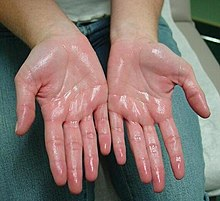Understanding the Causes of Hyperhidrosis
- Get link
- X
- Other Apps
Hyperhidrosis is a condition characterized by excessive sweating that occurs beyond what is necessary for regulating body temperature. This can significantly affect an individual's quality of life, leading to embarrassment, discomfort, and social anxiety. Understanding the underlying causes of Hyperhidrosis Treatment in Dubai is essential for effective diagnosis and treatment.
Types of Hyperhidrosis
Primary Hyperhidrosis
Primary hyperhidrosis is localized sweating, typically affecting specific areas such as the palms, feet, underarms, and face. This form of hyperhidrosis usually begins in childhood or adolescence and often has a hereditary component. It is thought to stem from an overactive sympathetic nervous system, which controls the sweat glands, leading to excessive sweat production even in non-stressful situations.
Secondary Hyperhidrosis
Secondary hyperhidrosis refers to generalized sweating that can affect the entire body and is usually a symptom of an underlying medical condition or a side effect of medication. Unlike primary hyperhidrosis, which is typically hereditary and localized, secondary hyperhidrosis can develop at any age and may require a thorough investigation to determine its cause.
Causes of Hyperhidrosis
Genetic Factors
Genetics play a significant role in primary hyperhidrosis. Research suggests that individuals with a family history of the condition are more likely to experience excessive sweating themselves. Genetic predisposition can affect how sweat glands function and the body's response to heat and emotional stimuli.
Nervous System Dysfunction
The autonomic nervous system (ANS) regulates involuntary bodily functions, including sweating. In hyperhidrosis, the sympathetic branch of the ANS may be overactive, leading to excessive sweating without the usual triggers like heat or exercise. This dysfunction can cause episodes of sweating in response to stress, anxiety, or even mundane activities.
Medical Conditions
Several medical conditions can lead to secondary hyperhidrosis, including:
- Diabetes: Fluctuating blood sugar levels or nerve damage in individuals with diabetes can trigger excessive sweating.
- Hyperthyroidism: An overactive thyroid increases metabolism, which can result in heightened sweating.
- Obesity: Excess weight can impede the body’s ability to regulate temperature, leading to increased perspiration.
- Infections: Certain infections, such as tuberculosis or HIV, can cause night sweats and increased sweating overall.
- Menopause: Hormonal changes during menopause can lead to hot flashes and excessive sweating in women.
Medications
Certain medications can cause excessive sweating as a side effect. Common categories of medications include:
- Antidepressants: Some antidepressants are known to cause increased sweating.
- Pain Relievers: Opioids and other pain medications may lead to excessive sweating.
- Hormonal Treatments: Medications for hormone replacement therapy can affect sweating patterns.
Lifestyle Factors
Lifestyle choices and environmental conditions can also contribute to hyperhidrosis. These factors include:
- Diet: Foods that are spicy, as well as caffeine and alcohol, can stimulate sweat production in some individuals.
- Stress and Anxiety: Emotional triggers can activate the sympathetic nervous system, resulting in increased sweating.
- Heat and Humidity: Warm weather and high humidity levels can exacerbate sweating, especially in individuals prone to hyperhidrosis.
Other Contributing Factors
Other factors that may contribute to hyperhidrosis include:
- Age: While hyperhidrosis can occur at any age, it often begins in adolescence or early adulthood.
- Sex: Studies suggest that men may experience hyperhidrosis more frequently than women, although the condition affects both genders.
Conclusion
Understanding the causes of hyperhidrosis is vital for individuals experiencing excessive sweating and their healthcare providers. By determining whether the condition is primary or secondary, one can gain insight into the underlying factors contributing to excessive sweating. Treatment options can vary depending on the cause and severity of the condition, including lifestyle changes, medications, and various therapeutic interventions. For those struggling with hyperhidrosis, seeking medical advice is essential for effective management and relief from symptoms.
- Get link
- X
- Other Apps




Comments
Post a Comment